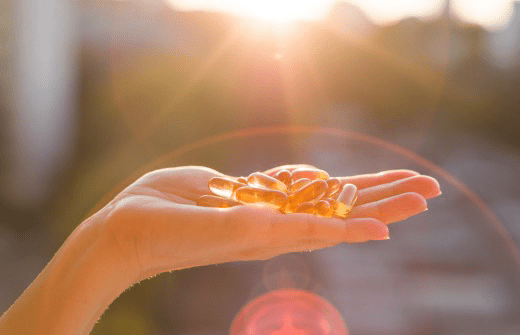The onset of autumn and shorter days with reduced sunlight disrupt the circadian rhythm, which often reflects on mood, energy, and sleep quality. Lack of light affects the production of serotonin and melatonin, which can result in mood swings or fatigue. Alongside adjusting daily routines—such as mindful light exposure and spending time outdoors—micronutrients like vitamin D, omega-3, magnesium, or specific adaptogens can also be useful tools in managing autumn mood fluctuations. Combined with simple rituals to support a healthy biorhythm, these strategies can help prevent autumn discomforts or at least ease them.
What will you learn in this article?
- Circadian rhythm as the basis of mental balance
- Nutrition as a foundation
- Vitamin D – testing, supplementation, and its effect on mental well-being
- Other key supplements that affect mental health
- Adaptogens – natural support for stress resilience
- Exercise and its impact on mental health
- When to seek professional help
- Key takeaways
Circadian rhythm as the basis of mental balance
Our body and its functioning are governed by an internal clock linked to the circadian rhythm. This 24-hour cycle is mainly controlled by light and darkness. As days shorten in autumn, the body produces more melatonin, the sleep hormone, and less serotonin, which is responsible for energy and good mood. This may manifest as sleepiness, irritability, and reduced motivation.

What helps keep the rhythm balanced?
-
Morning light: spending time outdoors within an hour of waking up and exposing yourself to natural light helps start the circadian rhythm and suppress melatonin production, which makes us feel sleepy.

- Evening hygiene: to maintain a healthy day/night rhythm, it is recommended to limit blue light exposure from phones and computers at least one hour before bedtime. If you have trouble falling asleep, you can try blue light-blocking glasses.

-
Consistent routine: going to bed and waking up at the same time supports healthy circadian rhythm functioning and mental stability. It is therefore advisable to keep this routine even on weekends.

Nutrition as a foundation
The most natural way to influence mental health and overall resilience, apart from daylight exposure, is a balanced diet.
Proteins not only play a role in building muscle mass and recovery, but they are also a key macronutrient for mental well-being – without sufficient intake of quality proteins, the body lacks the building blocks needed to produce neurotransmitters.
We therefore recommend foods rich in tryptophan, a precursor of serotonin – the “happiness hormone.” From animal sources, it is beneficial to include turkey and chicken, beef and lamb, fatty fish (salmon, tuna, sardines, mackerel), eggs, and dairy products from grass-fed production. From plant sources, you can choose legumes, seeds, nuts, or smaller amounts of oats.
The nervous system is also supported by certain micronutrients – zinc, selenium, iron, and iodine. Their sources include mainly liver, seaweed, wild-caught fish, and Brazil nuts. We definitely recommend avoiding excess alcohol and caffeine, which may increase irritability.
Vitamin D – testing, supplementation, and its effect on mental well-being
Especially in autumn and winter, sufficient levels of vitamin D play a crucial role. From October to March, sunlight is not strong enough in our region for the body to produce the necessary reserves, which is why its levels naturally drop. Vitamin D deficiency is associated with more frequent infections, higher risk of anxiety and depression, and impaired recovery. Moreover, its levels are quickly depleted with every cold or infection.
Vitamin D also regulates the expression of genes related to serotonin and dopamine, i.e., neurotransmitters that influence our mood. Therefore, low levels are often a common denominator in people suffering from seasonal depression.
Studies have shown that the active form of vitamin D increases the expression of the TPH2 (tryptophan hydroxylase-2) gene, which is a key enzyme for serotonin production in the brain. The result is greater serotonin availability in brain synapses—leading to better mood support and cognitive function. Vitamin D similarly affects the production and functioning of dopamine.
For this reason, we recommend checking your vitamin D blood level in the form of calcidiol – 25 (OH) D. Testing can be done in a laboratory or with a dried blood spot using a home Vitamin D Level self-test. It is advisable to repeat testing at the beginning of autumn and during winter. The optimal level is considered to be 100–150 nmol/l 25 (OH)D.

If below-average levels are detected, we recommend supplementation with vitamin D3 in combination with vitamin K2, to ensure proper calcium metabolism and its deposition in bones rather than soft tissues. Daily dosage should be based on laboratory results and typically ranges between 1,000–4,000 IU of “vitamin D3” per day.
Other key supplements that affect mental health
Since autumn is a more demanding period for the body, supplementation with other dietary supplements targeting the nervous system and mental resilience may also be suitable, alongside vitamin D.
-
Omega-3 fatty acids (EPA and DHA) are among the key substances for healthy brain cells. DHA makes up a significant portion of phospholipids in brain tissue and influences membrane fluidity, signal transmission, and synapse formation. EPA, on the other hand, has strong anti-inflammatory effects as it helps form specialized mediators that suppress chronic inflammation in the nervous system. Regular intake helps balance the omega-3 to omega-6 ratio in the body, “thereby improving mood and reducing the risk of depression.” They can be supplemented with fish oil, krill oil, or plant-based sources from freshwater algae.


We also recommend increasing the consumption of wild fatty fish such as salmon, mackerel, or sardines.
-
Magnesium is known for its calming effect on the nervous system, improving sleep, and reducing tension. For supporting mental health, magnesium bisglycinate or L-threonate are especially suitable.
Studies show that low magnesium levels may be linked to anxiety and depression. Magnesium in the form of L-threonate can cross the blood–brain barrier, thereby supporting neuron function and mood stabilization (by reducing the loss of dopamine receptors). Magnesium in the form of bisglycinate, due to its bond with the amino acid glycine, supports relaxation and quality sleep. Unlike L-threonate, it does not act directly on cognition but is effective for mood support and reducing psychological stress.
-
B vitamins: especially B6 (pyridoxine), B9 (folic acid), and B12 (cobalamin) – play a key role in the production of neurotransmitters such as serotonin and dopamine, which influence mood, motivation, and the ability to concentrate.
Vitamin B6 is a cofactor for enzymes that convert the amino acids tryptophan and tyrosine into serotonin and dopamine. A deficiency of vitamin B6 may therefore lead to reduced production of these neurotransmitters, resulting in increased irritability, fatigue, and a sense of “mental fog.”
Vitamin B9 (folic acid) and B12 (cobalamin) are essential for homocysteine metabolism. Their deficiency can also affect mood and concentration, and in sensitive individuals manifests as depressive or anxious symptoms. Since vitamin B12 is found only in animal sources, vegans are particularly prone to deficiency.You can read more about the role of B vitamins in health and how to recognize possible deficiencies in the following articles: B vitamins – invisible engines of our cells and More than just fatigue: How to recognize when your body lacks B vitamins.
Adaptogens – natural support for stress resilience
Adaptogens are natural substances that help the body cope with stress. With long-term use, they can improve mental stability and stress resilience.
-
Ashwagandha: an effective aid for regulating the circadian rhythm and combating mental discomfort, this adaptogenic herb (also known as Withania) reduces cortisol levels and helps restore its natural daily cycle. This supports healthy synchronization of the internal clock, helps maintain a regular sleep–wake rhythm, and reduces feelings of anxiety and mental exhaustion. This herb can therefore be taken both in the morning and evening without disrupting restful sleep.
-
Rhodiola rosea: is suitable for fatigue, supports concentration, and has a mildly stimulating effect, so it is not recommended for evening use. It increases serotonin and dopamine levels in the brain, thereby improving stress resilience and enhancing mood. Studies also show its positive effects in cases of mild to moderate depression and anxiety.
It is important to choose high-quality extracts or tinctures and start with lower doses to monitor the body’s individual response.
Exercise and its effect on mental health
Regular physical activity is one of the strongest natural mood enhancers. Exercise increases endorphin release and reduces stress. It also stabilizes the circadian rhythm – morning or forenoon activity helps kickstart the day, while gentle evening exercise (e.g., yoga) facilitates sleep.
If you are interested in learning more about how exercise, and especially muscle building, is also important for health, we recommend the article Muscle mass as a natural anti-age strategy.
We recommend any form of physical activity, from light exercise to strength sports, such as:
-
brisk walking in daylight,
-
yoga or pilates,
-
dancing or other forms of movement,
-
swimming,
-
spinning,
-
circuit training and strength exercises.

If below-average levels are detected, we recommend supplementation with vitamin D3 in combination with vitamin K2, to ensure proper calcium metabolism and its deposition in bones rather than soft tissues. Daily dosage should be based on laboratory results and typically ranges between 1,000–4,000 IU of “vitamin D3” per day.
When to Seek Professional Help
If symptoms of autumn blues and mental discomfort persist, worsen, or significantly interfere with daily life, it may be seasonal affective disorder (SAD). This is a type of depression that regularly occurs at certain times of the year, most often in autumn and winter when there is less daylight.
Warning signs:
-
long-term insomnia or excessive sleep,
-
severe fatigue, apathy, and loss of interest in everyday activities,
-
significantly worse concentration,
-
thoughts of hopelessness.
In such cases, it is important to seek help from a psychologist or doctor. Professional support may include psychotherapy, light therapy, and in some cases pharmacological treatment.



Key Takeaways
-
A consistent sleep–wake routine, morning exposure to daylight, and limiting blue light in the evening help stabilize mood and energy.
-
For good mental well-being, it is advisable to measure and, if necessary, supplement vitamin D (ideally combined with K2). It influences the production of serotonin and dopamine.
-
For reduced mental well-being, supplementation with omega-3, magnesium (L-threonate, bisglycinate), B vitamins (B6, B9, B12), or adaptogens such as ashwagandha and rhodiola is also recommended.
-
Quality proteins (tryptophan) and minerals (zinc, selenium, iodine, iron) are essential for neurotransmitter production and mental resilience.
-
Regular physical activity also helps improve mood by increasing endorphin production, reducing stress, and supporting sleep.
-
If problems persist or worsen, it may be seasonal affective disorder (SAD). In this case, it is advisable to seek help from a psychologist or therapist.
Sources:
https://pubmed.ncbi.nlm.nih.gov/12480364/
https://pubmed.ncbi.nlm.nih.gov/30008960/
https://pubmed.ncbi.nlm.nih.gov/24757497/
https://pubmed.ncbi.nlm.nih.gov/33864354/
https://www.sciencedirect.com/science/article/abs/pii/S0944711316000519?via%3Dihub























